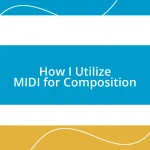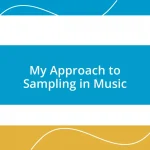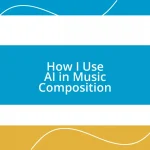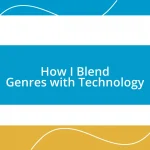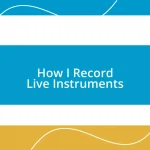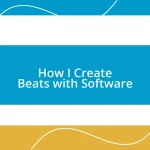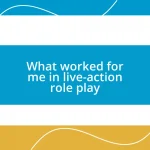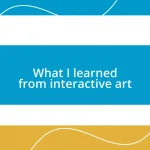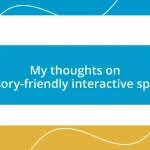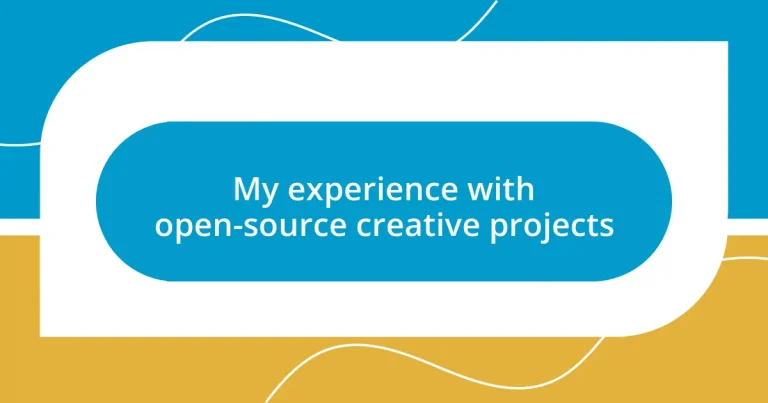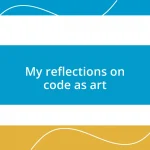Key takeaways:
- Open-source projects foster collaboration and inclusivity, allowing contributors to grow personally and professionally while embracing mistakes as learning opportunities.
- Choosing a project aligned with personal interests and skills enhances motivation and makes contributions more meaningful; factors to consider include passion, community support, and project impact.
- Effective contributions involve understanding community dynamics, embracing feedback for growth, and recognizing the power of collaboration, which can lead to lasting connections and enriched experiences.
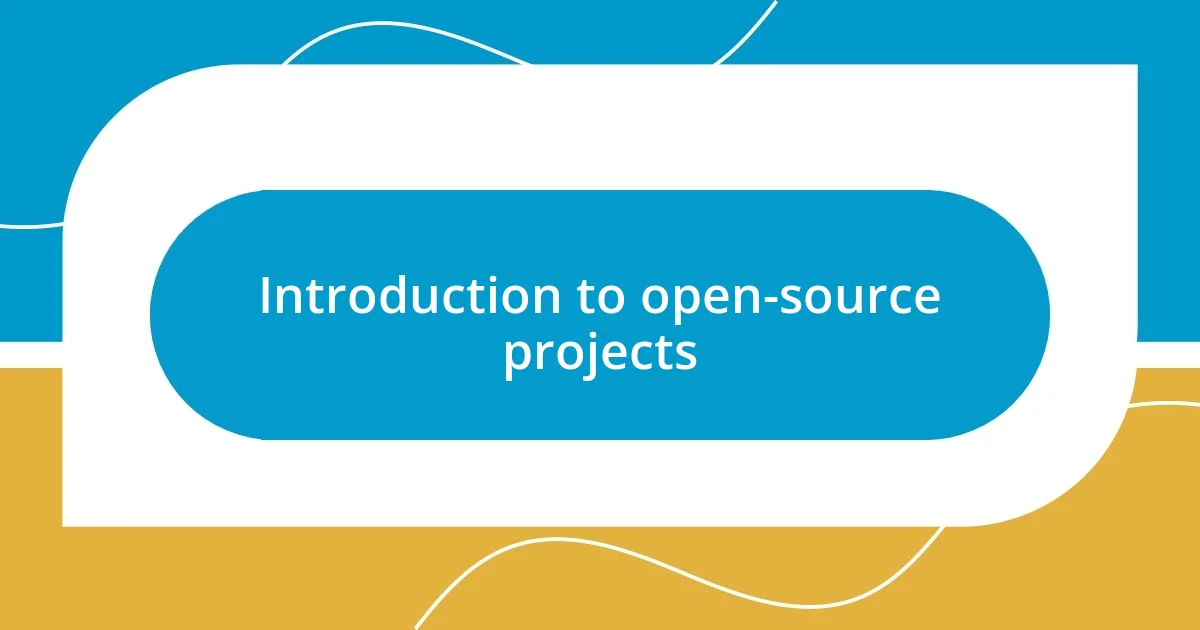
Introduction to open-source projects
Open-source projects are collaborative ventures where anyone can contribute, modify, or distribute software and creative content. I remember my first encounter with an open-source project; it felt like stepping into a vast community of passionate individuals, all working towards a common goal. This sense of shared purpose is what truly sets open-source initiatives apart—it’s about collaboration rather than competition.
In my experience, open-source projects thrive on transparency and inclusivity. It’s intriguing to think about how many brilliant ideas come from people all around the world, each bringing their unique perspective to the table. Have you ever wondered how a seemingly simple code change can spark innovation and create a ripple effect? I certainly have, and it’s moments like these that remind me of the power of diverse minds working together.
Participating in open-source projects can be both challenging and rewarding. There were times when I doubted my abilities, but the encouragement from fellow contributors pushed me to grow. It’s an environment where mistakes are not just tolerated but seen as learning opportunities. Isn’t it refreshing to be part of a community that values growth and creativity over perfection?
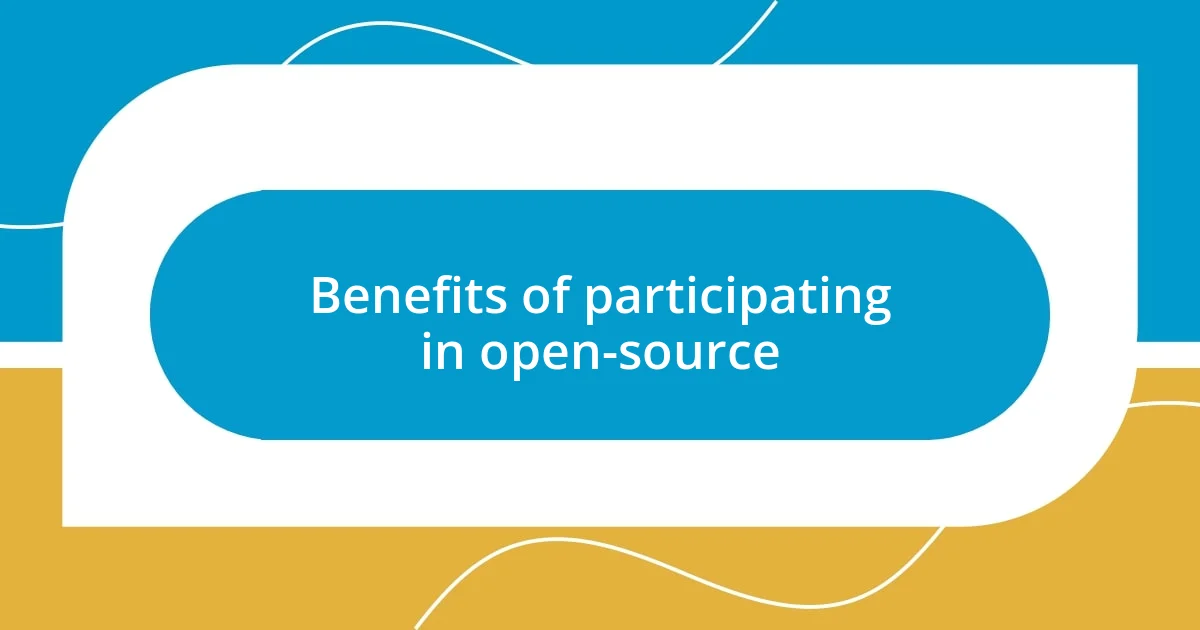
Benefits of participating in open-source
Participating in open-source projects offers immense personal and professional growth. I remember my first major contribution; I felt nervous yet excited, unsure if my input would resonate. However, as feedback flowed in from fellow contributors, I discovered a supportive network eager to help me evolve. This experience not only built my technical skills but also enhanced my ability to collaborate. Isn’t it amazing how stepping out of your comfort zone can lead to unexpected friendships?
Moreover, the skill enhancement that comes from these projects is unparalleled. Each task I took on forced me to learn new tools, languages, or practices. There were days filled with frustration over debugging, but the satisfaction of resolving an issue turned that frustration into motivation. I often find myself reflecting on how rewarding it is to see my contributions positively impact others. Can you recall a moment when your efforts brought joy to someone else? I cherish those moments deeply.
Open-source participation fosters a sense of belonging and purpose. I vividly remember contributing to a project aimed at improving accessibility for users with disabilities. Hearing from individuals whose lives were positively impacted by our work struck a chord with me. There’s a unique fulfillment in knowing that my efforts, however small, contribute to a larger mission. Each pull request is like a ripple in a pond—small, yet capable of creating waves of positive change.
| Benefit | Personal Experience |
|---|---|
| Skill Development | Learning new technologies while collaborating with experts in the field. |
| Community Support | Finding mentors and friends who helped me overcome challenges. |
| Sense of Purpose | The joy of seeing my work improve lives and make a difference. |
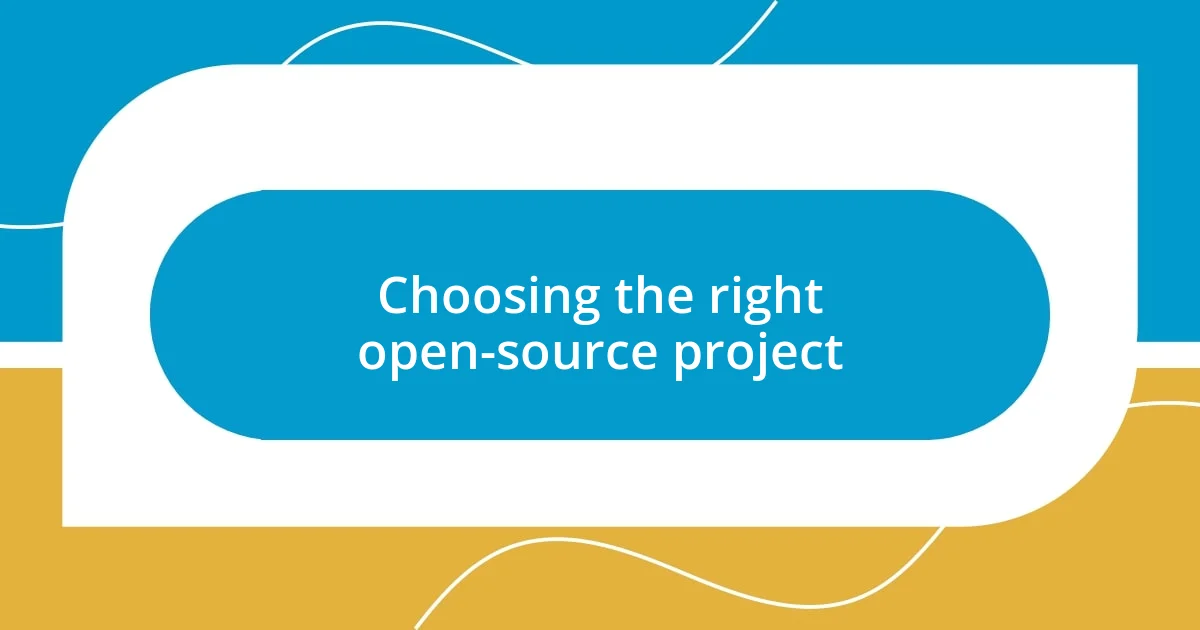
Choosing the right open-source project
Choosing the right open-source project can feel a bit overwhelming at first. I remember sifting through countless options, unsure where to invest my time and energy. It struck me how crucial it is to align your interests with the project’s mission and goals. Finding a project that resonates personally will not only keep you motivated but also make your contributions even more meaningful.
When selecting a project, consider the following factors:
- Passion: Does the project’s mission excite you?
- Community: Is the community inclusive and welcoming? I found friendly and supportive contributors enthusiastic about new members.
- Activity Level: Are there regular updates and active discussions? A vibrant project usually means more opportunities for learning.
- Skill Alignment: Does the project match your current skill set or push you to learn something new? Sometimes I chose projects that felt just out of my reach, and those experiences were incredibly rewarding.
- Impact: What difference does the project aim to make? Knowing that my work could enhance user experience or contribute to important societal goals kept me engaged.
By reflecting on these elements, you can make a more informed choice that enhances your journey in the open-source world.
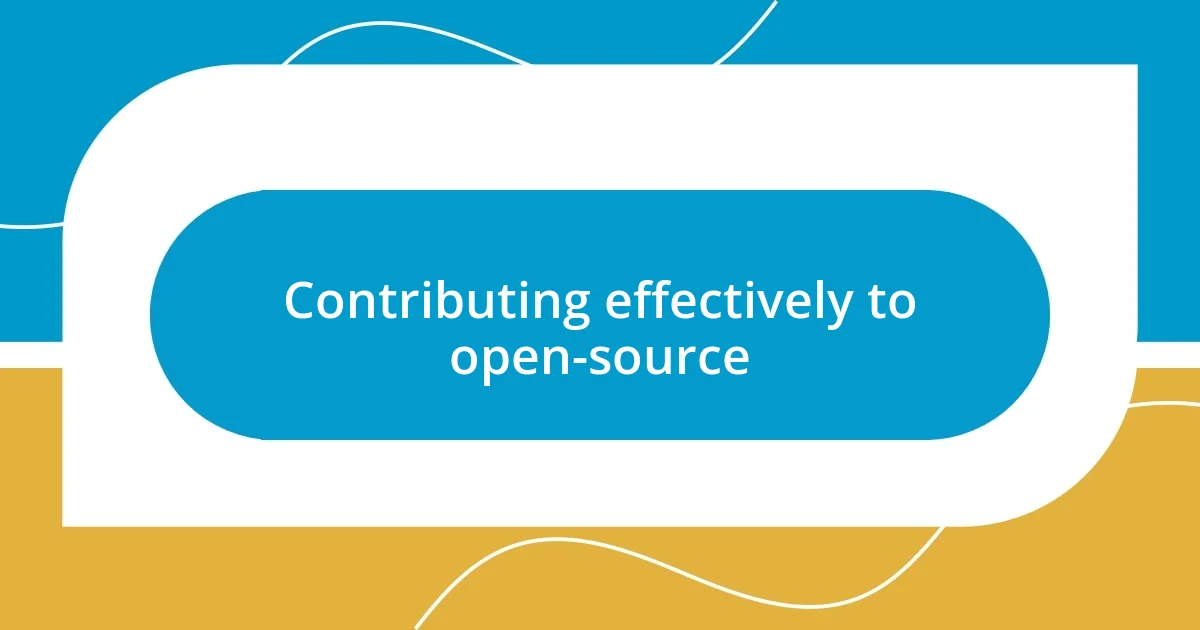
Contributing effectively to open-source
Contributing effectively to open-source isn’t just about writing code; it’s about understanding the community you’re joining. There was a time when I jumped into a project without fully grasping the existing dynamics. I quickly learned that communication and respect are paramount. The project’s contributors had their rhythms and norms, and recognizing those helped me to become a more effective member. Have you ever felt lost in a new group? I certainly have, and it taught me to reach out and ask questions, which paved the way for deeper connections.
Moreover, providing not just solutions but also thoughtful feedback can make a significant difference. I recall a project where I offered a feature suggestion that initially felt risky. Instead of fearing rejection, I approached it from a place of curiosity, seeking to understand broader perspectives. The ensuing discussion was enlightening, and it reminded me how valuable diverse viewpoints can be. Isn’t it incredible how sharing ideas can strengthen the project and encourage growth among all contributors?
Finally, consistency in your contributions is key. I remember when I committed to a small task every week, which gradually led to me taking on bigger challenges. Consistency built trust within the team and demonstrated my dedication. It’s like a gentle push on a swing; small, steady efforts can create significant motion over time. Have you experienced a similar growth pattern in your work? This steady commitment not only enriches your skills but also reinforces your presence in the community, strengthening your value as a contributor.
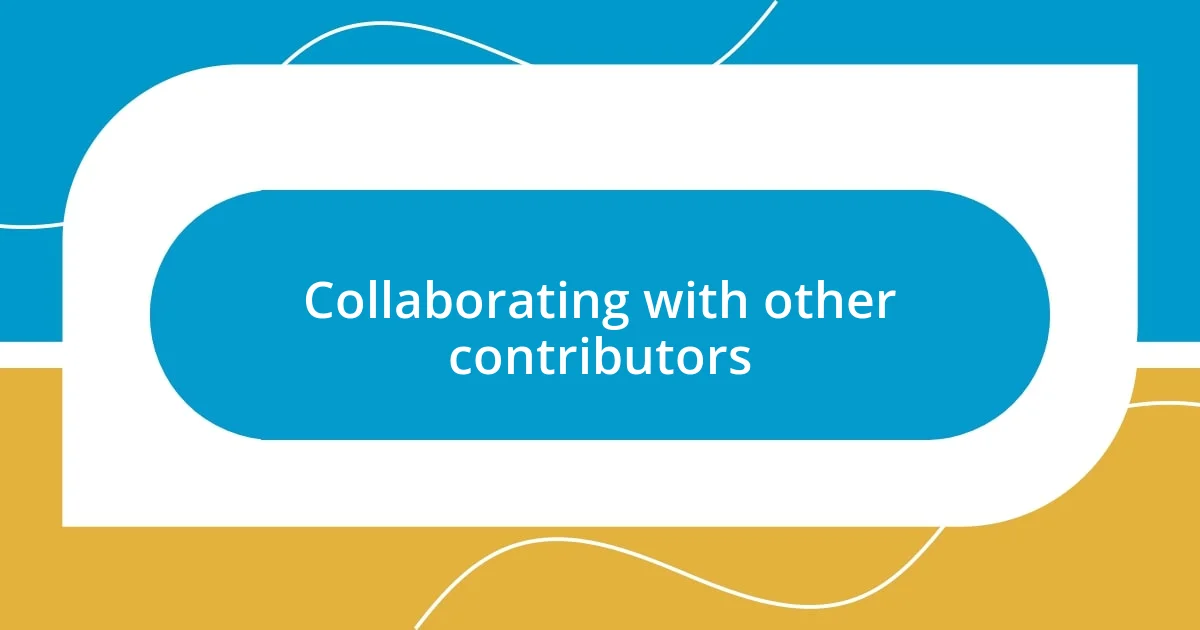
Collaborating with other contributors
Working with other contributors can be both exhilarating and challenging. I vividly recall my first collaborative effort on an open-source project. It was eye-opening to witness how various skills and ideas meld together to create something greater than a single individual could produce. At times, though, I found myself overwhelmed by differing opinions and approaches. Have you ever navigated a group with diverse perspectives? I certainly have, and learning to embrace those differences ultimately enhanced my experience.
One of the most rewarding aspects of collaboration is the opportunity to learn from others. There was one instance where a fellow contributor shared a unique coding technique I had never encountered. It wasn’t just a technical lesson; it felt like a personal gift, and I realized how fortunate I was to tap into a wealth of knowledge. Engaging in discussions not only refined my skills but also fostered friendships that extended beyond the project itself. Isn’t it amazing how collaboration can cultivate lasting connections in a digital world?
Equally important is the balance of giving and receiving feedback. Early in my contributions, I struggled with critique and took comments too personally. Over time, however, I learned to view feedback as a powerful tool for growth. I remember a moment when a mentor challenged me to rethink my approach to a design feature. Instead of feeling defensive, I accepted the guidance and improved the end result. This shift in mindset opened doors to richer interactions and made it easier to approach others with my suggestions. How has feedback shaped your own contributions? I’ve seen it transform projects and elevate collective efforts to new heights.
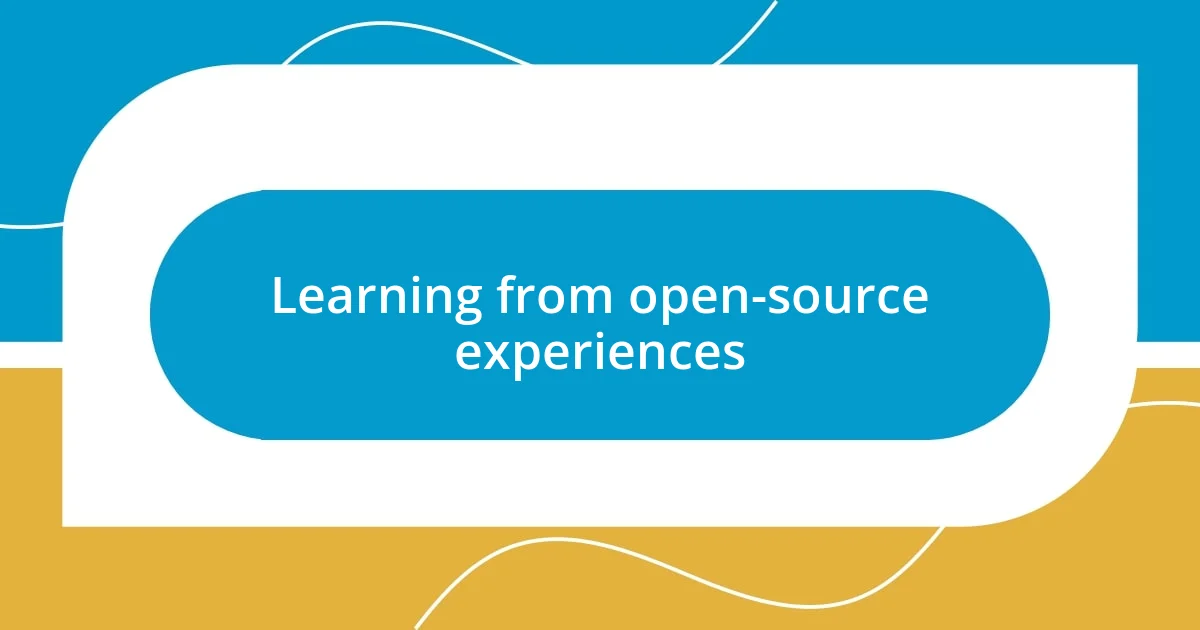
Learning from open-source experiences
My journey through open-source has unveiled a wealth of unexpected learning moments. For instance, I once joined a project where I assumed understanding the documentation was enough. It wasn’t until I hit a wall troubleshooting my code that I realized the real value lay beyond text—it was in the vibrant discussions within the community. Have you ever been so focused on one aspect that you missed the bigger picture? This experience taught me that real learning can happen in the most conversational, casual exchanges with fellow contributors.
There was also a moment that sticks with me: I volunteered to lead a community initiative with little prior experience. Initially, I felt the pressure of responsibility and uncertainty clawing at my confidence. However, diving into the collaborative process took me by surprise. The way everyone rallied to share ideas and solutions revealed how powerful collective knowledge truly is. Isn’t it fascinating how stepping out of your comfort zone can lead to incredible insights? That experience not only deepened my understanding but also solidified friendships with like-minded individuals who were just as passionate about the project.
On another note, I found that facing setbacks is a crucial component of growth in open-source work. There was a time I faced a significant roadblock due to a miscommunication in the project’s requirements. It could have been discouraging, yet I chose to see it as an invaluable lesson—both in how to clarify expectations and in recognizing the importance of patience during the development process. How do you usually respond when you encounter challenges? This reflective approach transformed my perspective on failure and showed me that learning often comes from the bumps along the road.
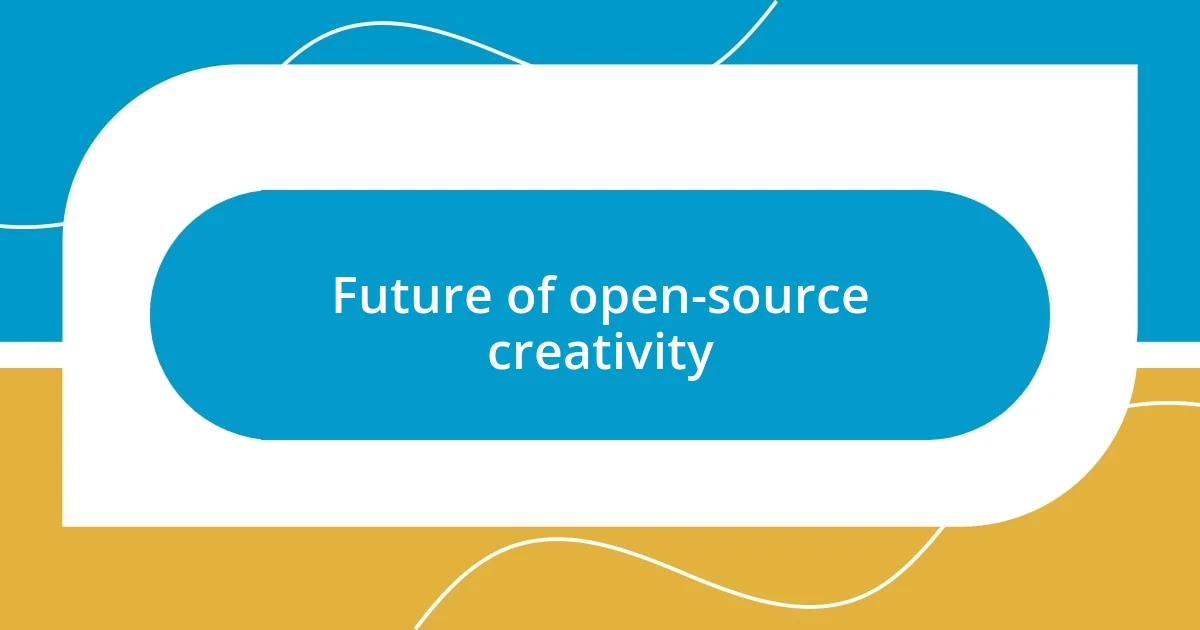
Future of open-source creativity
The future of open-source creativity feels incredibly bright to me. With the rise of innovative platforms and tools, I see more creators being able to share their work and collaborate across borders. Just the other day, I was chatting with a fellow contributor who mentioned how a simple app helped bridge communication gaps in global projects. Isn’t it exciting to think about how technology continuously breaks down barriers in creativity?
As I look to the horizon, I believe that diversity in contributions will only enhance projects further. Every different voice adds a new layer of richness, and I always appreciate how varied backgrounds lead to unique perspectives. I recall working with a graphic designer from another country who introduced me to cultural elements I had never considered. It truly broadened my understanding of what creativity can be! Have you had similar experiences that expanded your creative vision?
I can’t help but wonder about the sustainability of these projects moving forward. Balancing passion with the demands of everyday life can be challenging for many. In my own experience, I have grappled with finding time to nurture my contributions while managing other responsibilities. So, what’s the solution? I think fostering a community that offers support and resources to one another is key. After all, isn’t open-source creativity all about collaboration and mutual growth?
